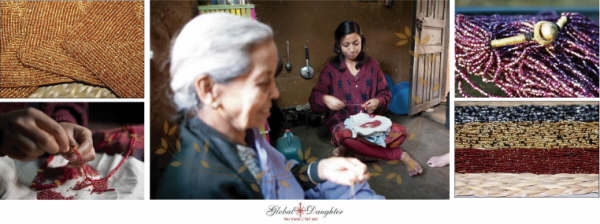

Teej or 'Haritalika' is a festival of fasting, dancing and elation, celebrated by the Hindu women in Nepal. It takes place in early September every year. This event is a riot of red, with women donning red- head to foot -and enthusiastically displaying emotion in public.
Teej serves as a great opportunity for women bound to their homes to get a much welcome break from their daily chores and duties to relax with friends, family and neighbors. The married women are happily welcomed back to their paternal homes after the finish of the rice-planting season. Only women/girls who have reached puberty participate in the festivities. By participating in this festival and fasting for 24hrs, unmarried women/girls believe they will find a good husband, and the married women believe the longevity and prosperity of their husbands will be secured.
Legends say the Goddess Pavati, Divine Mother, worshipped at length to get Lord Shiva, The Supreme God, as her husband. It took her 108 rebirths to get Shiva. Finally, he was touched by her devotion and love and married her. It is said that to commemorate her achievement, Parvati promoted the festival from then on among women, promising them happy married lives and longevity for their husbands.
Teej also represents a retreat with one's friends. Legends say that Parvati's father wanted her to marry Vishnu, The Preserver, but Parvati refused and ran away with the help of her friends. Then she underwent intensive Tapasya (deep thought) to win-over Shiva.
The first day of Teej is "Dar Khane"- a day to enjoy delicious traditional Nepali dishes. Married women visit their parental homes, visit temples, and get together with other women and dance until midnight. After which, a 24 hour fast commences.
The second day is the fasting day or Nirjala (fasting even without water or liquids). This tradition of women spending the whole day without food or water is practiced in the villages and even in the urban areas of Nepal. They gather at crossroads or Shiva temples decked out in red saris, similar to the style of a bride. This event gives women, old and young, the chance to dress like a bride again (or for the first time).
Pashupati Temple receives tens of thousands of women devotees on this day. Worshipping of the Shiva Linga, the phallic symbol of Shiva, with flowers, oil lamps, is the major event of the day. The third or last day of the festival is Rishi Panchami when women pay homage to Sapta Rishi (seven holy stages) by giving donations and bathing in the holy waters of the Bagmati River.
Teej songs openly reflect the discrimination and suffering women face in Nepal. For most women it is still the only day they have to voice their sadness and rebellion without fear of reprisal or judgement from society. Some emotions displayed in the songs have lyrics that, when translated, are disturbing and not at all hopeful: "How and what to sing when I have agonies; Teej has arrived to add tears to saddened hearts; streams of blood can be seen dancing and singing around; The sound of musical drums has been replaced by bomb and guns; we landed at a brothel with a life from hell; the notorious traffickers should be punished as severely as possible."

3 comments:
Those pictures are so beautiful, really. What sad lyrics.
Wow, what beautiful photos.
Beautiful pictures!! I found you through Marcie's blog. I have really enjoyed reading your blog and all the light you are shedding on different countries and how the people live and their circumstances. thank you for making me aware of the hardships, now that I know the question how do I respond? How do we all respond? Thank you for what you are doing.
Em
Post a Comment